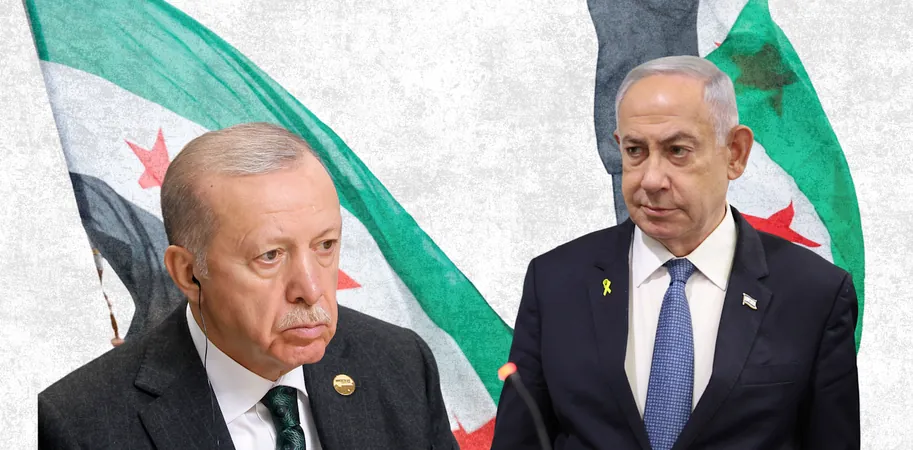
The Emerging Rivalry in the Middle East: Turkey and Israel's Tensions Over Syria's Future
2024-12-18
Author: Ting
The Emerging Rivalry in the Middle East: Turkey and Israel's Tensions Over Syria's Future
A Bitter Standoff Unfolds
The discord between Turkey and Israel is intensifying, particularly under the leadership of Turkish President Recep Tayyip Erdoğan and Israeli Prime Minister Benjamin Netanyahu. Both nations are maneuvering to capitalize on the shifting dynamics in Syria, indicating a fierce competition lies ahead.
Turkey's engagement in Syria has taken a controversial turn, with reports suggesting that it has supported the Sunni rebel faction, Hayat Tahrir al-Sham (HTS), in its aim to dethrone Assad. Iranian leaders have hinted that HTS's recent military successes could not have been achieved without Turkish backing.
With Assad out of the picture, Erdoğan seeks to position Turkey not only as a prominent power in the region but also as a leader in the Sunni Muslim world, reminiscent of the once-great Ottoman Empire, which he believes could have included major Syrian cities like Aleppo and Damascus if historical circumstances had favored Turkey differently. Erdoğan's government has also swiftly reopened its embassy in Damascus, offering its influence to help HTS shape a new Islamist regime while opposing any concessions to Kurdish groups in northeast Syria.
Conversely, Israel has seized the opportunity to further its territorial ambitions in Syria, particularly in the strategically essential Golan Heights. It has engaged in military actions targeting Syrian military assets—described by Israel's foreign minister as an essential measure to hinder these assets from falling into the hands of extremist factions that threaten Israel's national security.
However, Turkey condemns Israel's tactics, viewing them as aggressive land grabs, and this discontent is shared by several Arab nations advocating for respect of Syrian sovereignty.
The Impact of HTS Leadership
Despite rising tensions, HTS head Ahmad al-Sharaa (a.k.a. Abu Mohammad al-Jolani) has expressed a desire to avoid conflict with Israel. He has publicly committed to preventing groups within Syria from launching attacks against the Jewish state, while simultaneously demanding Israel withdraw from territories it occupies in accordance with a post-1973 Yom Kippur War agreement.
At the forefront of this rivalry is Erdoğan, historically an advocate for the Palestinian cause and a staunch critic of Israeli policies. Since the onset of the recent Gaza conflict, Erdoğan's rhetoric has escalated, critiquing Israel's military strategies and calling for a united Arab-Islamic front against what he describes as Israeli "genocide."
In return, Netanyahu has frequently derided Erdoğan, branding him a “joke” for his autocratic tendencies in Turkey and accusing him of committing violence against the Kurdish population.
American Diplomacy in Play
The United States, maintaining strong ties with both Turkey and Israel, is leveraging diplomatic efforts to guide HTS's influence in a direction favorable to its interests. These efforts include ensuring support for Kurdish allies in northeast Syria and sustaining an American military presence in the region to combat the resurgence of ISIS.
Nevertheless, with the growing tensions between Turkey and Israel, Washington faces a complex challenge in mediating their rivalries. Some analysts speculate that if Israel were to solidify its military foothold in the Golan Heights, the potential for an Israeli-Turkish military confrontation could escalate, though an all-out war is not expected imminently.
Consequences for Iran
The ousting of Assad represents a significant setback for Iran, which has spent decades solidifying its influence in the region. Assad's regime provided Iran with critical support and a vital supply route to Hezbollah in Lebanon. The loss of this ally has sparked intense internal debate within Tehran regarding its regional strategy and ability to shape the conflict in Syria.
As HTS's leader publicly excludes collaboration with Iran and Hezbollah, Iran’s influence over the new Syrian dynamics appears increasingly tenuous. Al-Sharaa has indicated that priorities will focus on establishing a stable government in Syria rather than confronting Israel, potentially deepening the divide between moderate and hardline factions within Iran.
As new alliances form and the geopolitical landscape continues to shift, the fate of Syria and broader Middle Eastern stability hangs in uncertainty, with the actions of HTS and the responses of external powers like Israel and Turkey poised to shape the region's future.


 Brasil (PT)
Brasil (PT)
 Canada (EN)
Canada (EN)
 Chile (ES)
Chile (ES)
 Česko (CS)
Česko (CS)
 대한민국 (KO)
대한민국 (KO)
 España (ES)
España (ES)
 France (FR)
France (FR)
 Hong Kong (EN)
Hong Kong (EN)
 Italia (IT)
Italia (IT)
 日本 (JA)
日本 (JA)
 Magyarország (HU)
Magyarország (HU)
 Norge (NO)
Norge (NO)
 Polska (PL)
Polska (PL)
 Schweiz (DE)
Schweiz (DE)
 Singapore (EN)
Singapore (EN)
 Sverige (SV)
Sverige (SV)
 Suomi (FI)
Suomi (FI)
 Türkiye (TR)
Türkiye (TR)
 الإمارات العربية المتحدة (AR)
الإمارات العربية المتحدة (AR)